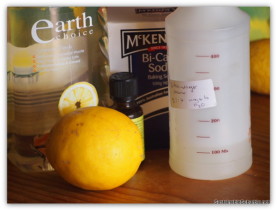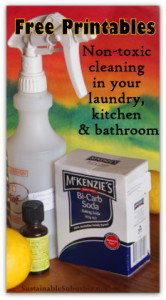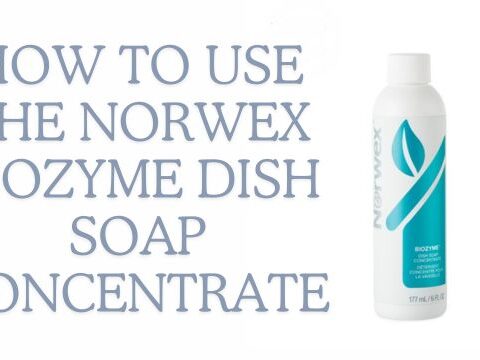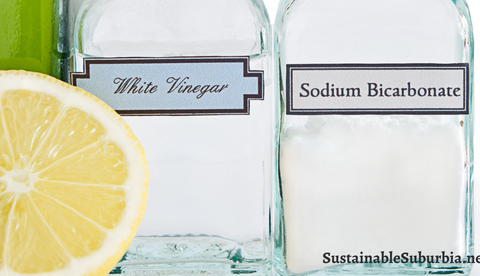Last updated on June 24th, 2022 at 01:36 pm
There’s a reason that laundry pre-wash stain removers sell so well.
 It’s because treating stains as you go is a pain in the butt, and just impractical when those stains appear on your kid’s clothes during school hours or child care. Rinse out the paint while it’s still wet? Good luck.
It’s because treating stains as you go is a pain in the butt, and just impractical when those stains appear on your kid’s clothes during school hours or child care. Rinse out the paint while it’s still wet? Good luck.
However, it is a fact that many a stain will come out best if you treat it immediately, and with the right product. Soda water, salt or even just plain water can all do wonders here, used the right way.
But what about the stains that don’t get treated immediately? That’s what I’m interested in, because frankly, if I changed my kids’ clothes as often as they get berry juice/paint/ink/etc on them, I would have to hover and wash all day.
Not to mention my older kids might well leave their clothes under their beds for two weeks before putting them in the wash…
Also, the truth is, my husband does most of the laundry in our house, and he wants a simple, spray-on stain remover, not something with three steps and a twenty minute wait before washing or where he has to stop and think for each stain to decide what to use.*
So, with that in mind, here are three general stain removers and their pros and cons.
Simple Soap for Stains
Rub either dishwashing liquid or some castile liquid soap into the stain. You can also rub on a bar soap. Put through the wash as usual.
- Pros: Simple and inexpensive (if you use the dish or bar soap). Dishwashing liquid is especially good for grease stains. Plus you probably have some in the house and you don’t need to mix anything up.
- Cons: Not so useful for large stains, or kid’s clothes that are simply grotty all over. A spray on stain remover works better here.
Tip: Katie Kimball of Kitchen Stewardship recommends going for your strongest dishwashing liquid for old grease stains. “I might be willing to turn a blind eye to whatever ingredients might be offensive in one bottle of Dawn, which I would buy for my laundry room if it could give me 100% success in saving clothing lost to the grease stain monsters” she says in an article on Simple Home Made.
Gentle Pre-Treating Spray
Note: I’ve edit this now I have a better understanding of the chemistry of mixing vinegar (an acid) and bicarb soda (a base). They do work together really well in cleaning, but only when freshly mixed. So there’s no point in pre-mixing them, as this recipe originally suggested. No wonder it wasn’t very effective!
120 ml (4 fl oz) white vinegar
240 ml (8 fl oz) boiled or distilled water
Bbicarb soda (baking soda) as needed
Mix together vinegar & water, and pour into a spray bottle. Label with the name, ingredients and date.
Fill a Parmesan cheese or chocolate shaker with bicarb soda.
You can spray the vinegar solution onto your grubby clothes and allow it to soak in for a few minutes before washing, for a mild cleaning effect. For extra power, use neat vinegar and/or sprinkle the area first with bicarb soda, then spray on vinegar solution and allow the mixture to ‘bubble’ through the stain.
- Pros: This is a simple, completely non-toxic spray made entirely from ingredients you can eat! And, if you’re not using the bicarb soda, it’s quick and easy to use over large areas.
- Cons: On the other hand it is not the most effective spray against serious stains. If you dry your clothes in an electric dryer, make sure you pull the stained ones out to check before letting the dryer bake them on. Of course, you should always do this anyway.
Tougher Spray-on Stain Remover
2/3 cup of your favourite dishwashing liquid
2/3 cup ammonia
6 Tbsp bicarb soda (baking soda)
2 cups warm water
Mix together all ingredients, and pour into a spray bottle. Label with the name, ingredients and date. Shake before use. For extra tough stains, let it soak in a few minutes before washing (don’t let it dry). You can also rub it into the fabric: just fold the item over and rub it together for a few seconds.
- Pros: Most effective of the lot for tougher stains. Easy to apply to large areas.
- Cons: Not as non-toxic or eco-friendly as the gentle recipe above. Ammonia is okay for your grey water, quickly breaking down into natural salts, but not so good for your lungs if you inhale the fumes. In particular, never use ammonia if you have asthma or other chronic respiratory problems. Also poisonous if swallowed. Depending on what dishwashing liquid you favour, it may be quite benign from an environmental perspective or not, ditto for swallowing. Moral: Keep this out of reach of children, and use sparingly. Also, will clog up a fine spray bottle. Try Barbara Lord’s recipe below to avoid this.
(This recipe came from One Good Thing by Jillee; Barbara Lord’s Green Cleaner has almost the same recipe, but without the bicarb soda, and with 1-2 tsp of lemon or Eucalyptus oil. I haven’t tried it that way yet though.)
Warning: Never mix ammonia with chlorine bleach: it will produce a toxic gas. That means, don’t use this spray if there could be chlorine bleach residue in your machine.
Get Your Free Printables
 If you’d like my standard set of non-toxic cleaning recipes for your laundry, kitchen & bathroom, sign up to get my new Non-toxic Cleaning Printables.
If you’d like my standard set of non-toxic cleaning recipes for your laundry, kitchen & bathroom, sign up to get my new Non-toxic Cleaning Printables.
These Free Printables will make your life easier, because you won’t ever have to look those recipes up again. Other readers have put them on the laundry or kitchen wall, or inside the pantry cupboard. Where will you put them?
Plus, you get bonus updates of the recipes and the occasional subscriber only emails.
So what are you waiting for? Go get ’em!
_______________
*Of course, knowing your stains and treating some differently, will make a difference to your mileage. For instance, protein stains like blood will cook in if you use hot water on them, and are best soaked in cold water and salt as soon as possible.
This post was shared at:
Thrifty Thursday | Frugal Fit Family | Freedom Fridays




I make all of my own cleaners and agree that they are awesome!! I did not know to add ammonia for tougher stains! GREAT TIP!!! Thanks for linking up to frugalfitfamily!
Glad to be there heather, and to have given you a new tip to use 🙂
Environmentally friendly (also eco-friendly, nature friendly, and green) are ambiguous terms used to refer to goods and services, laws, guidelines and policies claimed to inflict reduced, minimal, or no harm at all, upon ecosystems or the environment.^”
I think this is among the most significant info for me. And i am glad reading your article. But wanna remark on some general things, The website style is great, the articles is really great : D. Good job, cheers
No, it doesn’t. Maybe you’re thinking of bicarb and vinegar? The bicarb neutralizes the vinegar fairly quickly (as in, you don’t need much bicarb to react a whole bottle of cooking vinegar because it’s such a weak dilution), though even then there can be benefits.